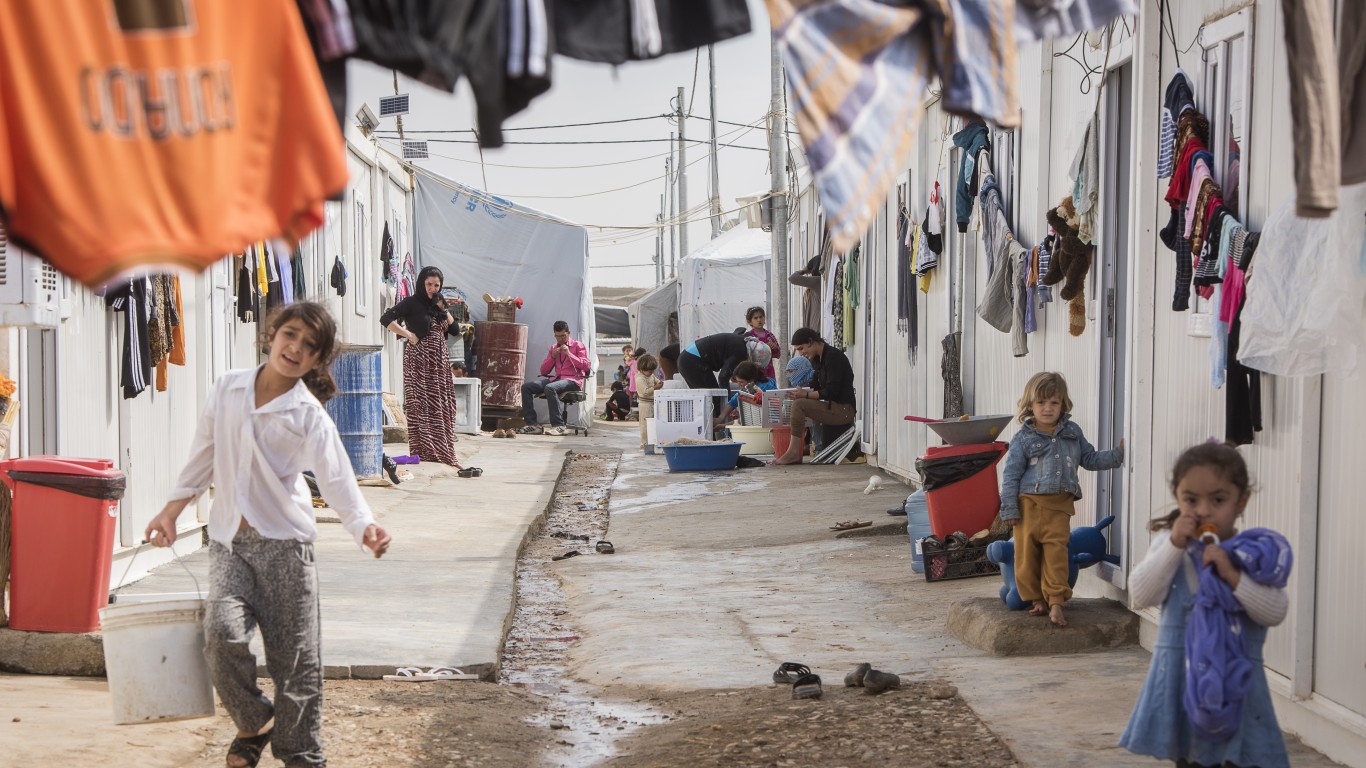
The world’s population is approaching 8 billion people, as the annual number of births exceeds deaths by about 18 million a year and the population is growing at an annual rate of 0.9%. While the population is growing on every continent, nowhere is the Earth’s population increasing faster than in Africa.
To determine the 25 countries that will grow the most in the 21st century, 24/7 Wall St. reviewed data on population projections from the U.S. Census Bureau’s International Programs Center. Countries were ranked based on the percentage change in projected population from 2022 to 2100. Data on the crude birth rate in 2019 and net migration from 2013 to 2017 are from the World Bank. Migration figures were adjusted for population using data from the World Bank.
All of the top 25 countries that will grow the fastest in the 21st century are in Africa, and every nation on the list has projected population growth of more than 165% in the 21st century. Though Africa’s mortality rate has been historically among the world’s highest, it has been falling because of improvements in medicine that helped reduce the threat of outbreaks such as cholera and ebola. Meanwhile the birth rate in Africa remains very high.
With the exception of Ghana, all the countries have a crude birth rate of more than 30 per 1,000 people, and six of them have a rate that exceeds 40 per 1,000. This is considerably higher than the average crude birth rate worldwide of 18 births per 1,000. The U.S.’s crude birth rate is 11 per 1,000.
Gifted with abundant resources, home to some of the youngest demographics in the world, and led by more stable governments, Africa is developing rapidly and attracting foreign investors. Consequently, African economies such as Ghana, Senegal, Ethiopia, and Tanzania are among the fastest-growing on Earth. (Find out if any are among the list of countries dominated by foreign investment.)
A report from the United Nations Department of Economic and Social Affairs predicts four of the world’s 10 most populous countries — Brazil, Bangladesh, Russia, and Mexico — will be supplanted by the African nations of Democratic Republic of Congo, Ethiopia, Tanzania, and Egypt.
While a more prosperous Africa may be accompanied with a more populous Africa, a Pew Research Center report raised concerns that rapid population increases may raise the poverty level in Africa. These are the poorest countries in the world.
Click here to see countries that will grow the most in the 21st century
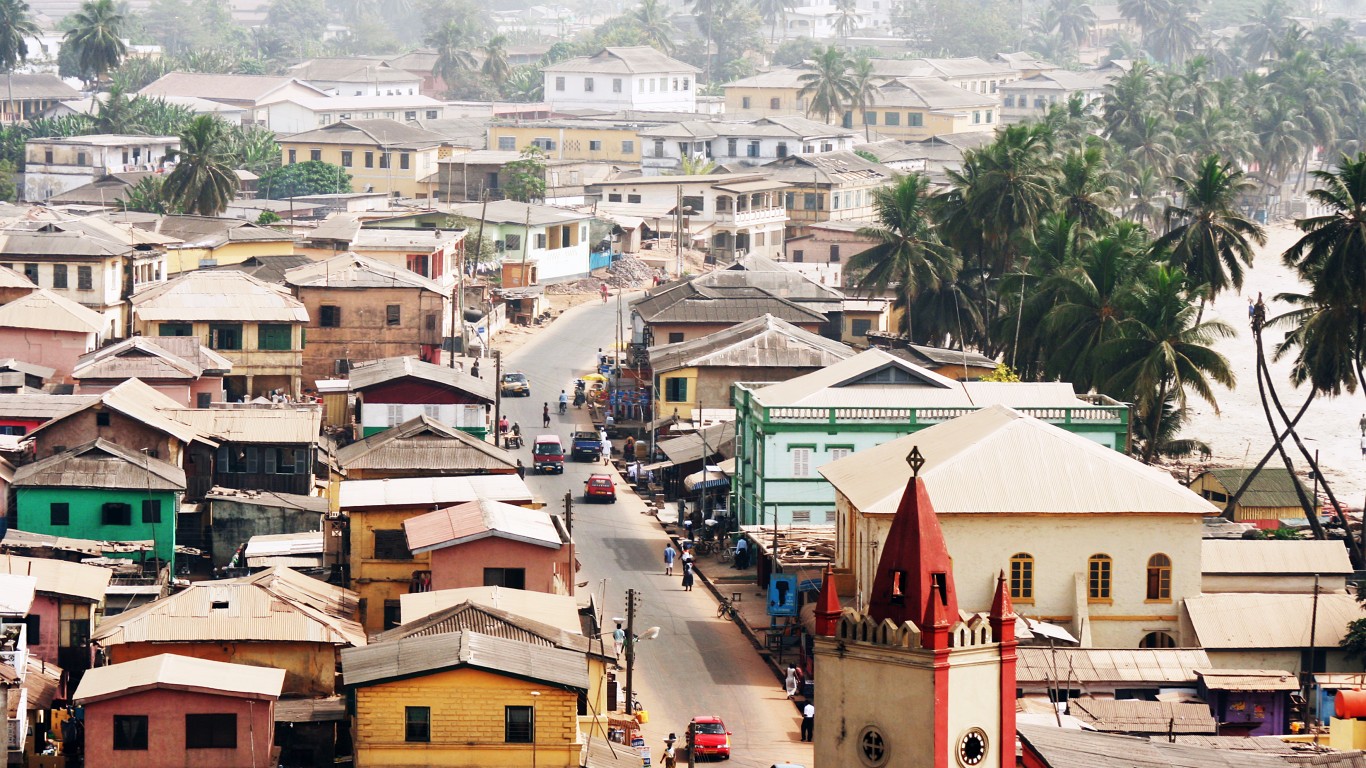
25. Ghana
> Projected growth, 2022 to 2100: +165.8% (+54.9 million people)
> Current population: 33.1 million
> Crude birth rate: 29.0 per 1,000 people
> Annual net migration: -0.4 per 1,000 residents
[in-text-ad]
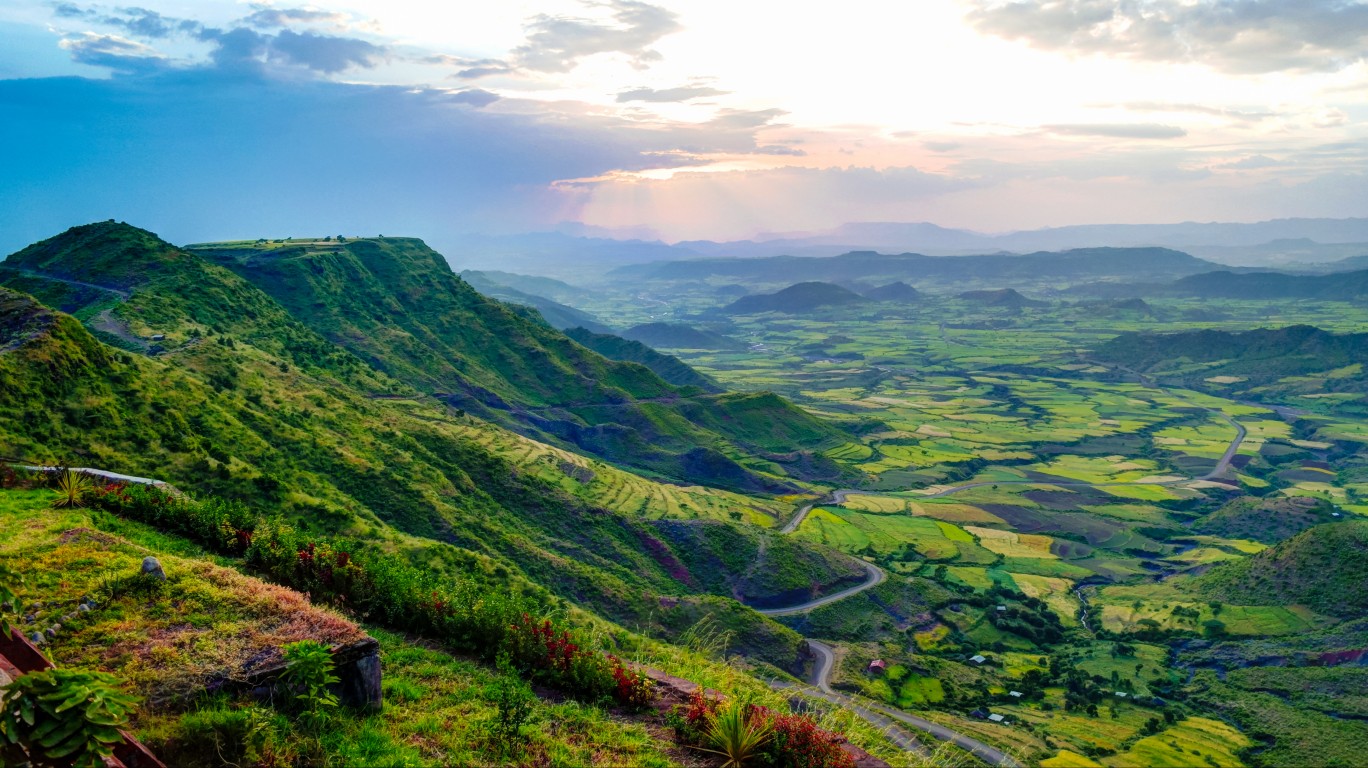
24. Ethiopia
> Projected growth, 2022 to 2100: +168.6% (+191.6 million people)
> Current population: 113.7 million
> Crude birth rate: 31.9 per 1,000 people
> Annual net migration: +0.3 per 1,000 residents
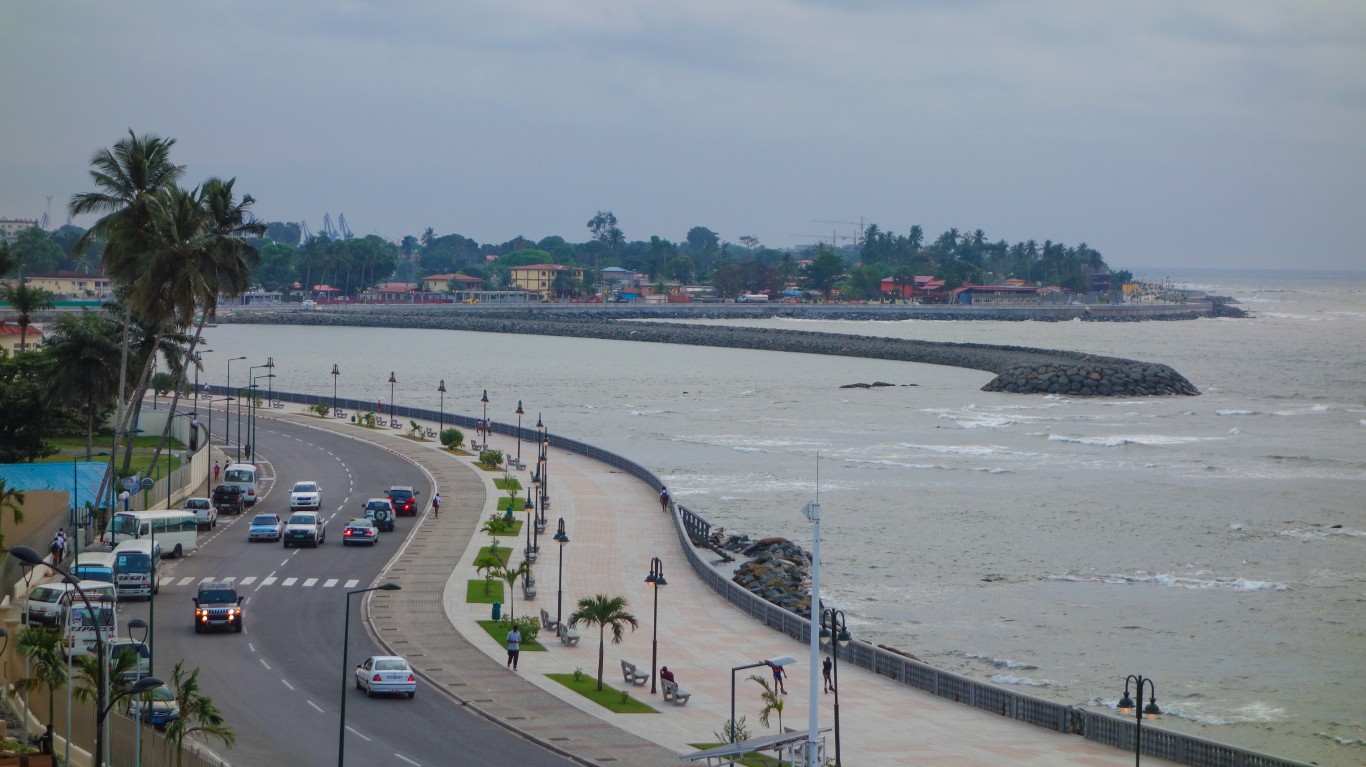
23. Equatorial Guinea
> Projected growth, 2022 to 2100: +182.2% (+3.1 million people)
> Current population: 1.7 million
> Crude birth rate: 32.8 per 1,000 people
> Annual net migration: +13.7 per 1,000 residents
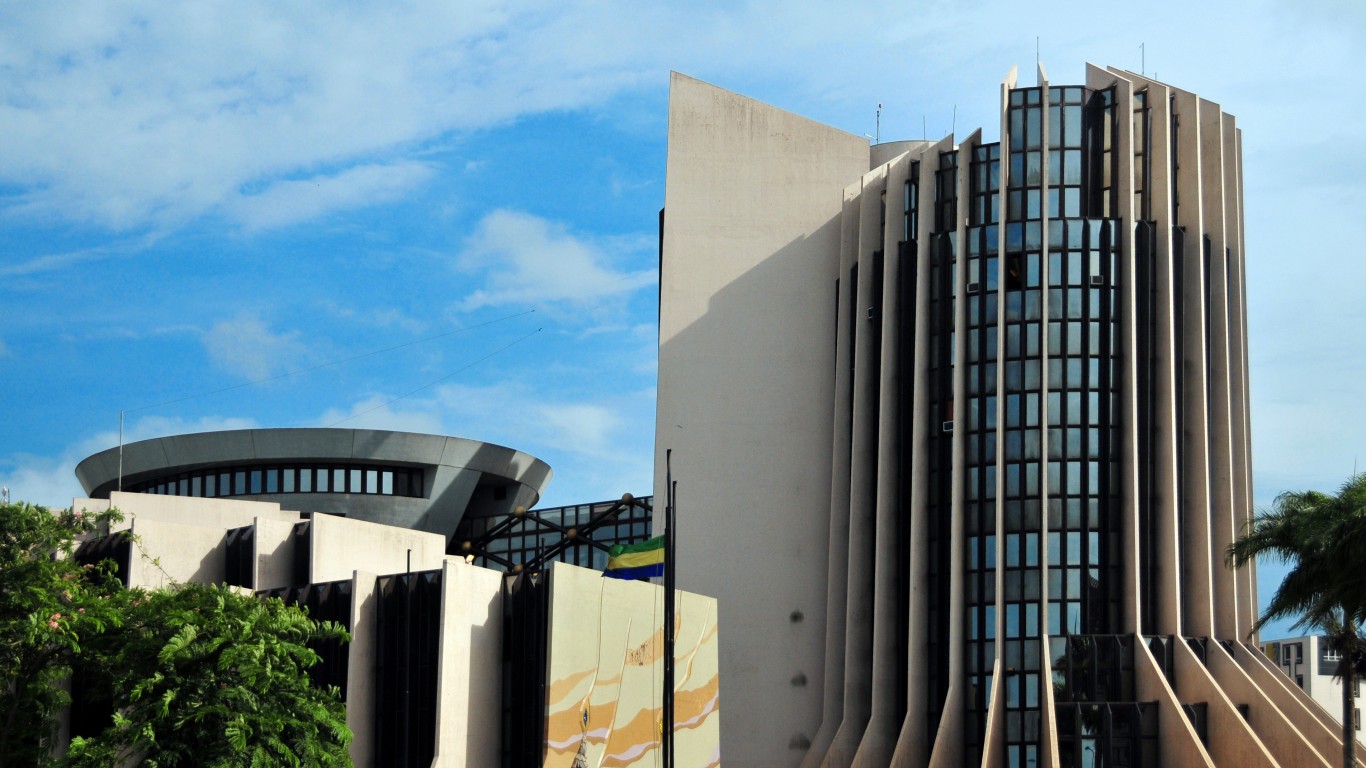
22. Gabon
> Projected growth, 2022 to 2100: +187.3% (+4.4 million people)
> Current population: 2.3 million
> Crude birth rate: 31.0 per 1,000 people
> Annual net migration: +1.7 per 1,000 residents
[in-text-ad-2]
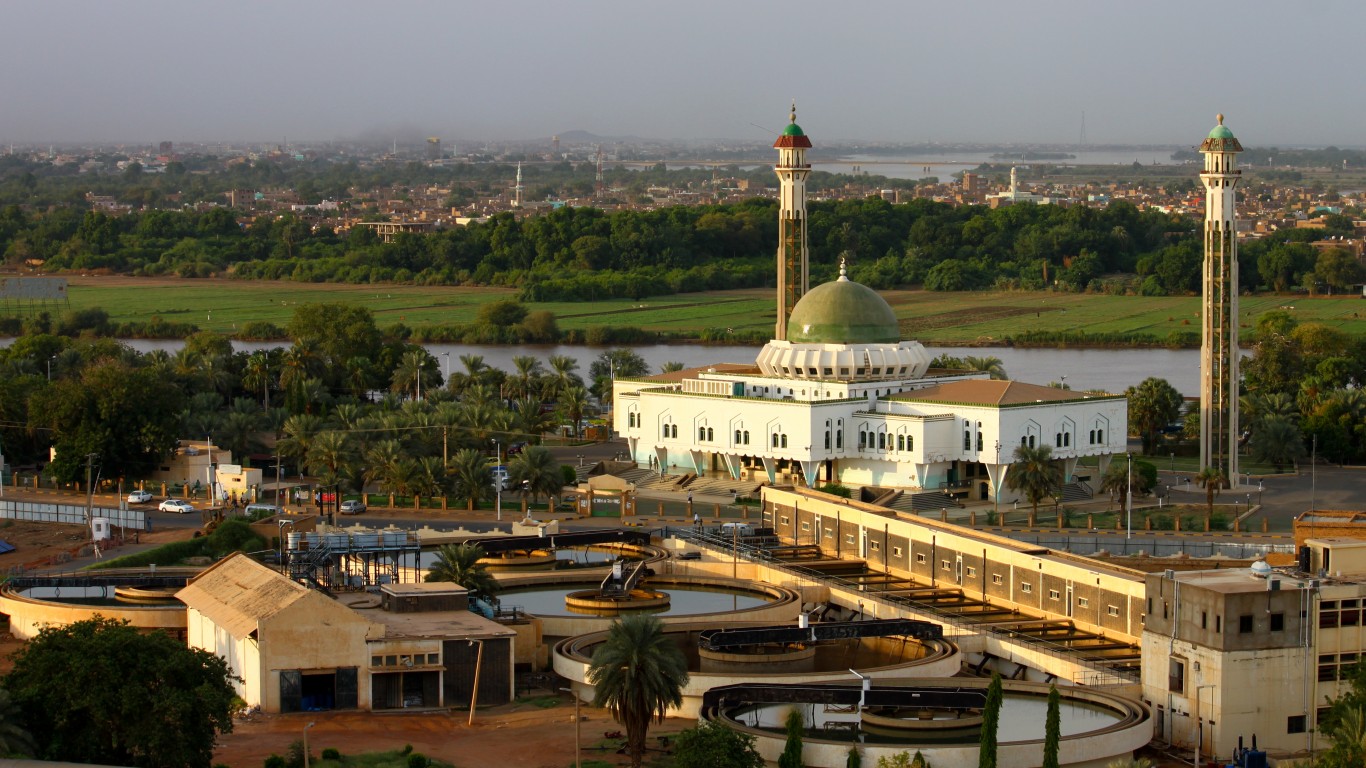
21. Sudan
> Projected growth, 2022 to 2100: +211.5% (+101.4 million people)
> Current population: 48.0 million
> Crude birth rate: 31.8 per 1,000 people
> Annual net migration: -1.3 per 1,000 residents

20. Togo
> Projected growth, 2022 to 2100: +213.0% (+18.1 million people)
> Current population: 8.5 million
> Crude birth rate: 32.7 per 1,000 people
> Annual net migration: -0.3 per 1,000 residents
[in-text-ad]
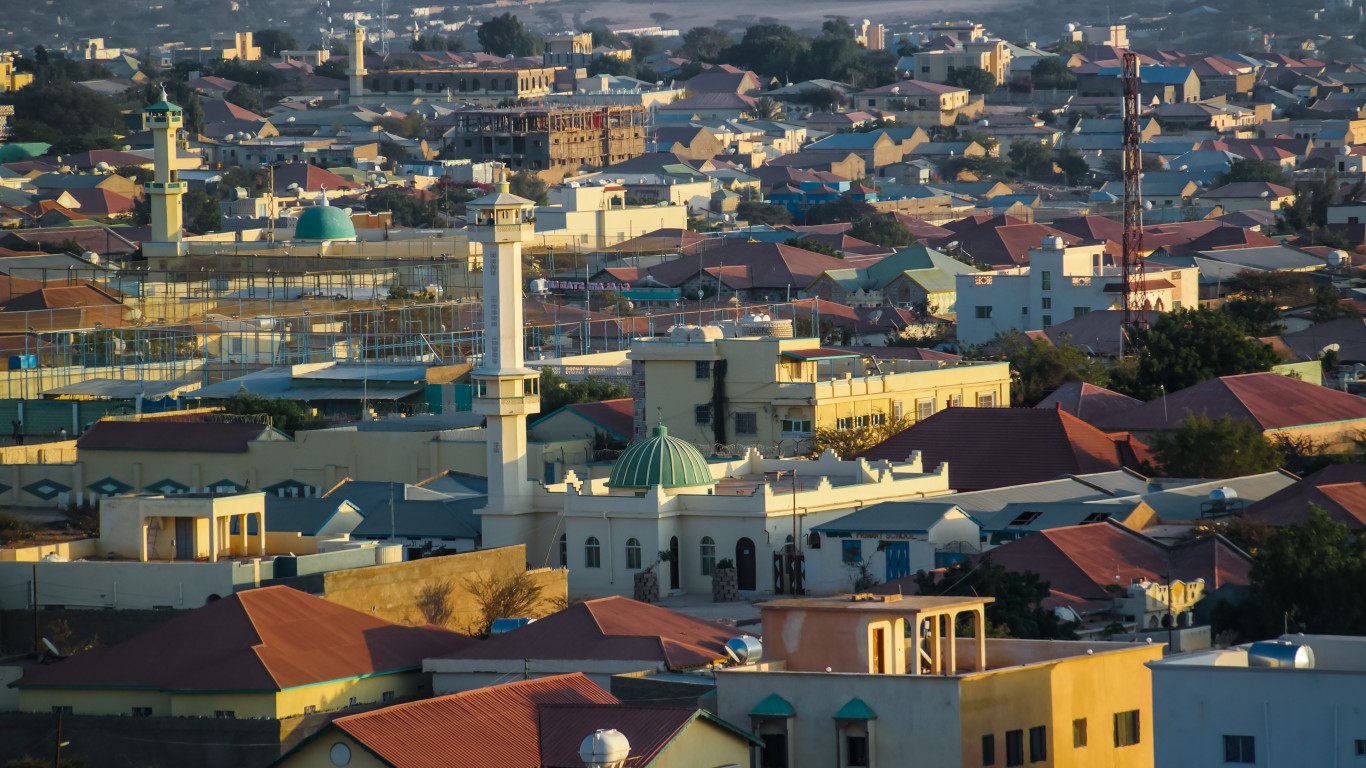
19. Somalia
> Projected growth, 2022 to 2100: +214.0% (+26.5 million people)
> Current population: 12.4 million
> Crude birth rate: 41.6 per 1,000 people
> Annual net migration: -2.9 per 1,000 residents
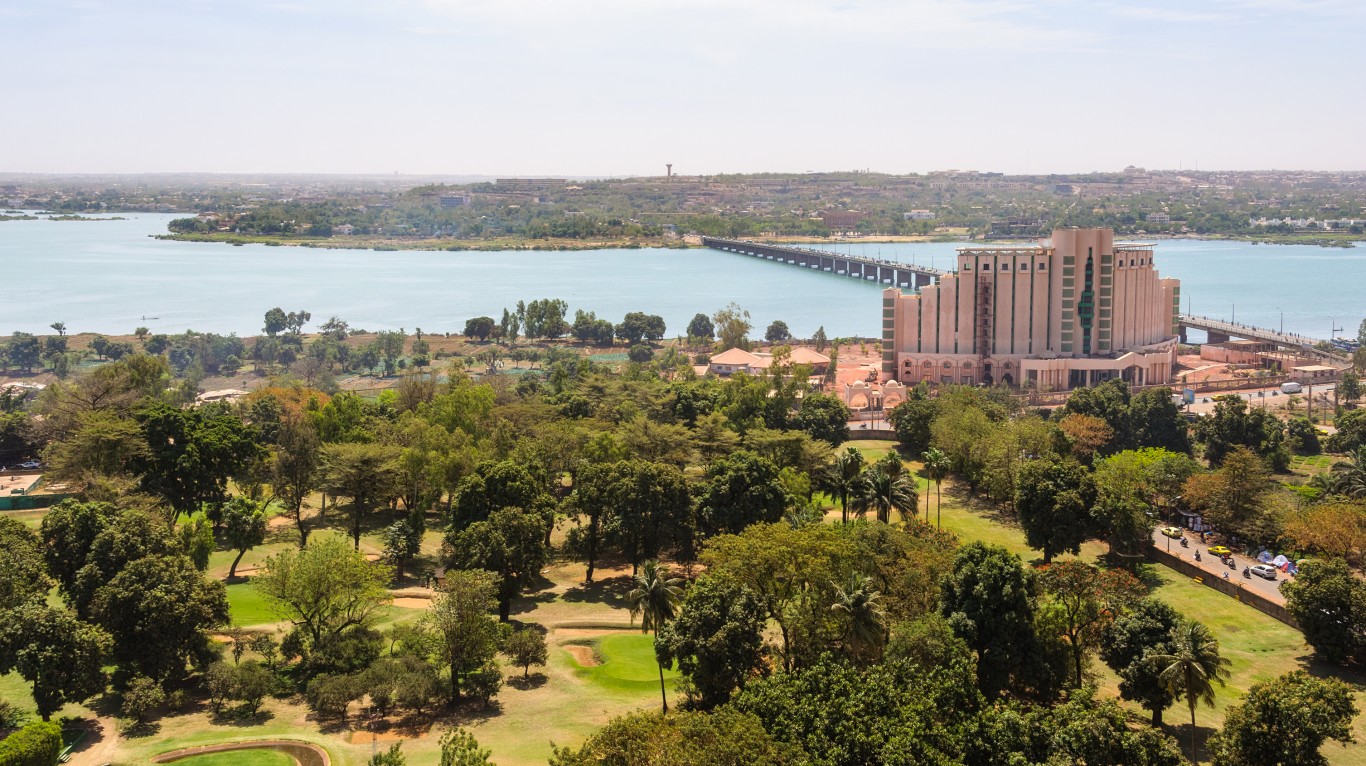
18. Mali
> Projected growth, 2022 to 2100: +237.0% (+49.2 million people)
> Current population: 20.7 million
> Crude birth rate: 41.0 per 1,000 people
> Annual net migration: -2.3 per 1,000 residents
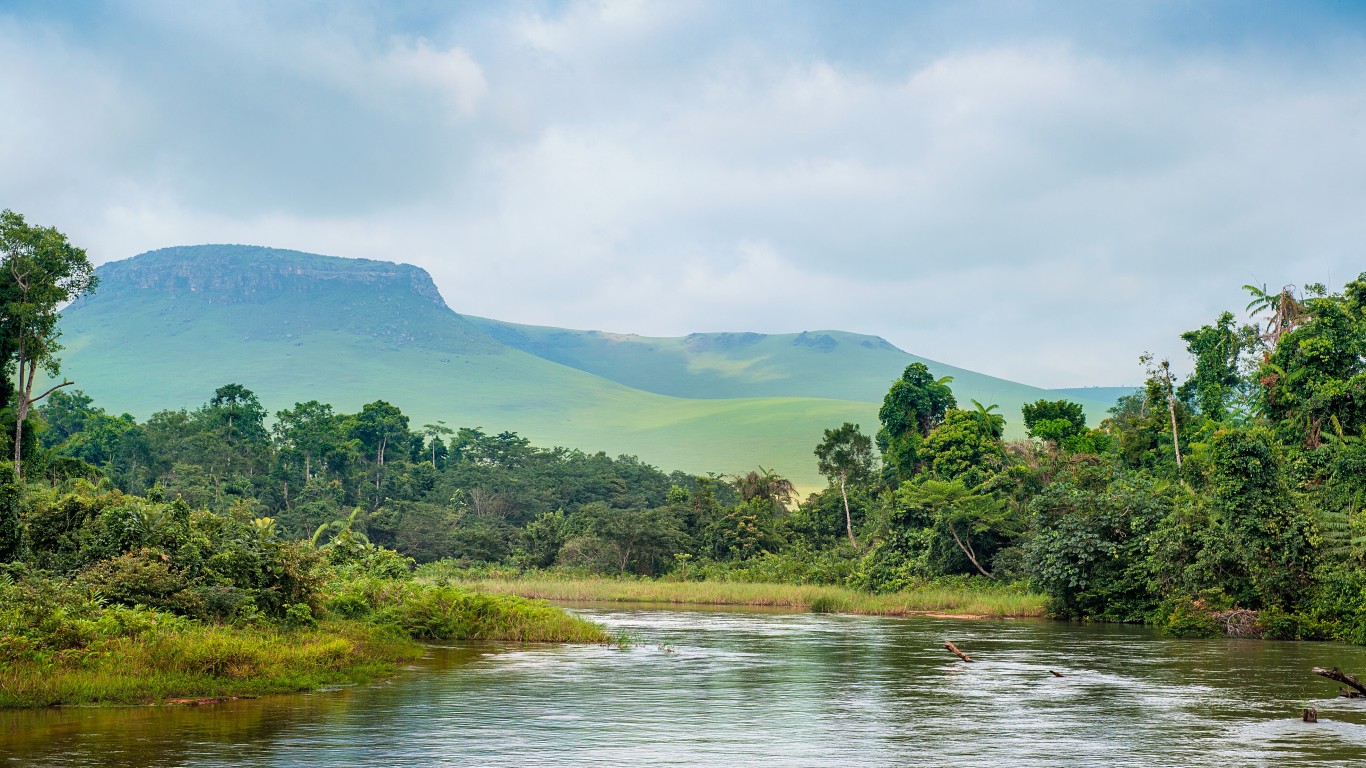
17. Republic of the Congo
> Projected growth, 2022 to 2100: +246.6% (+13.7 million people)
> Current population: 5.5 million
> Crude birth rate: 32.4 per 1,000 people
> Annual net migration: -0.8 per 1,000 residents
[in-text-ad-2]
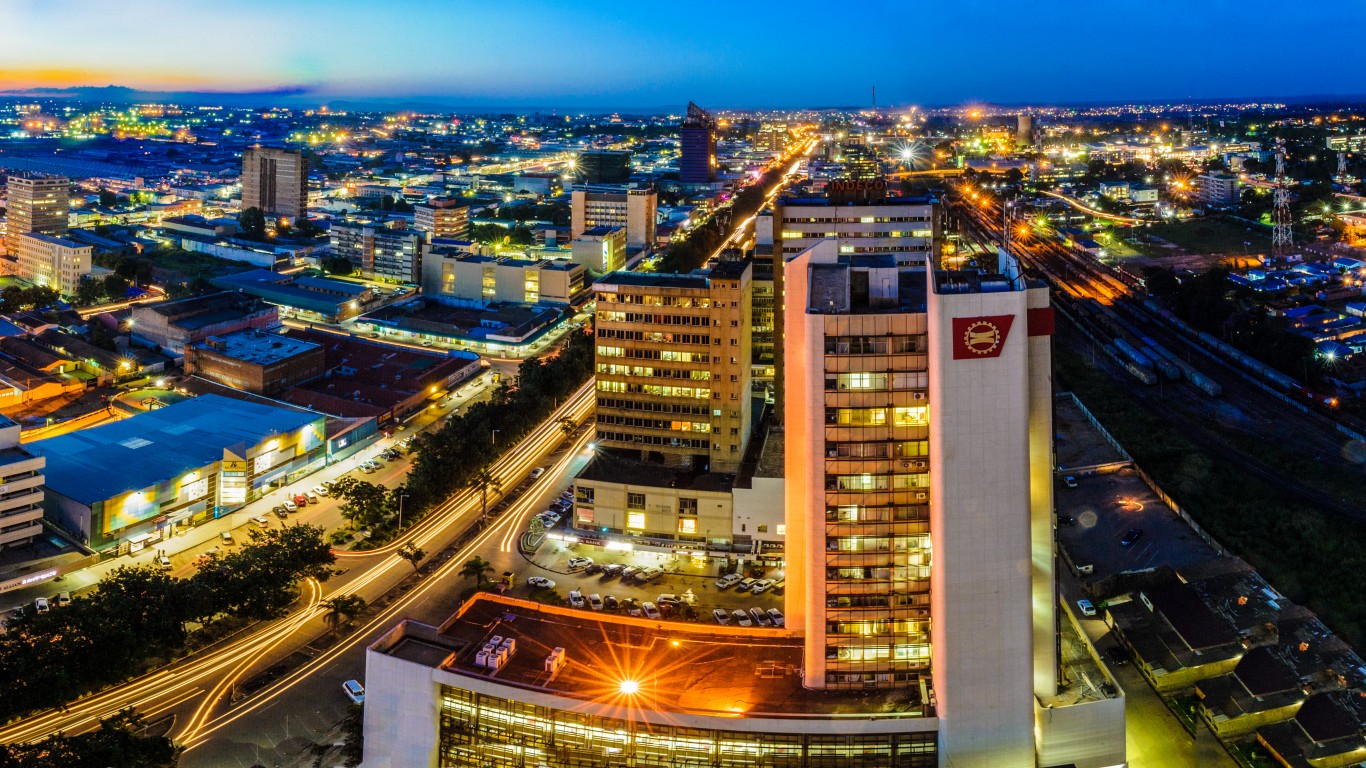
16. Zambia
> Projected growth, 2022 to 2100: +262.4% (+51.5 million people)
> Current population: 19.6 million
> Crude birth rate: 35.8 per 1,000 people
> Annual net migration: -0.5 per 1,000 residents
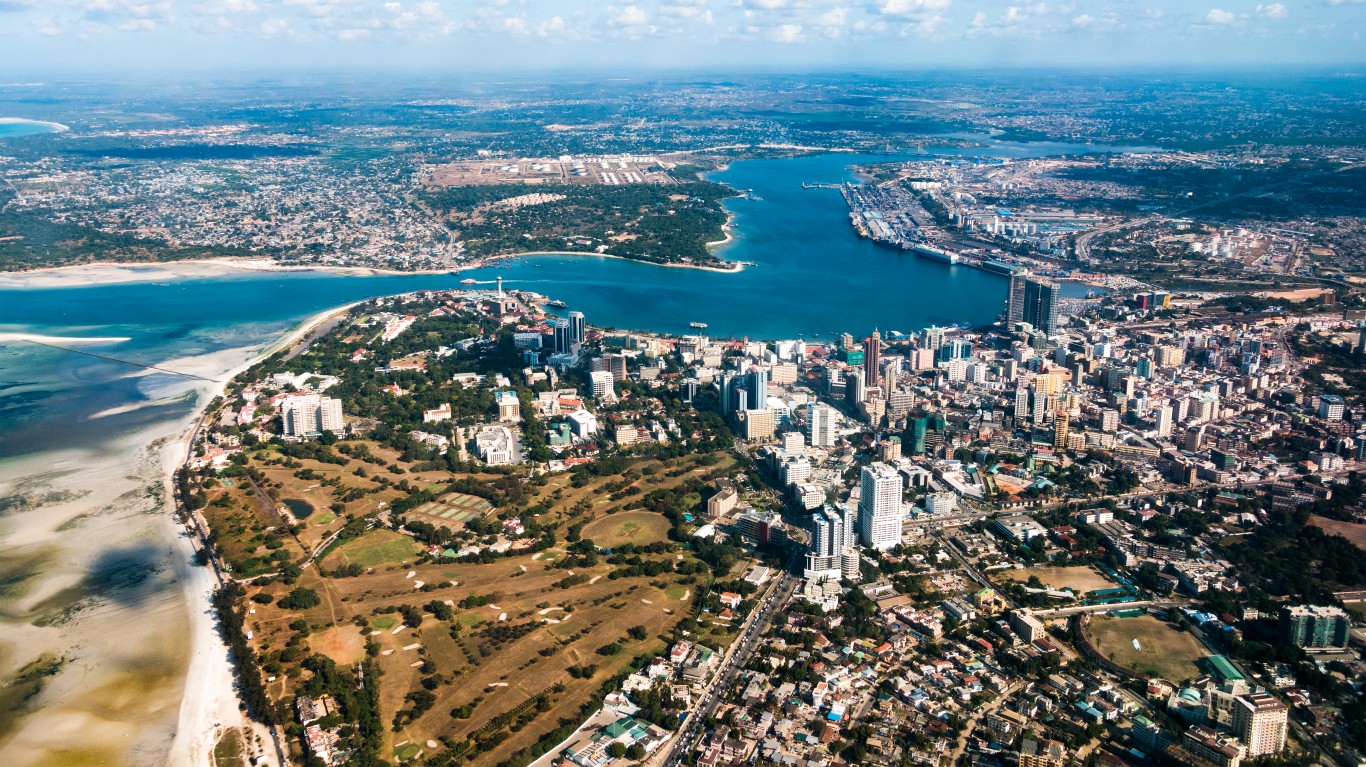
15. Tanzania
> Projected growth, 2022 to 2100: +263.7% (+168.4 million people)
> Current population: 63.9 million
> Crude birth rate: 36.3 per 1,000 people
> Annual net migration: -0.8 per 1,000 residents
[in-text-ad]
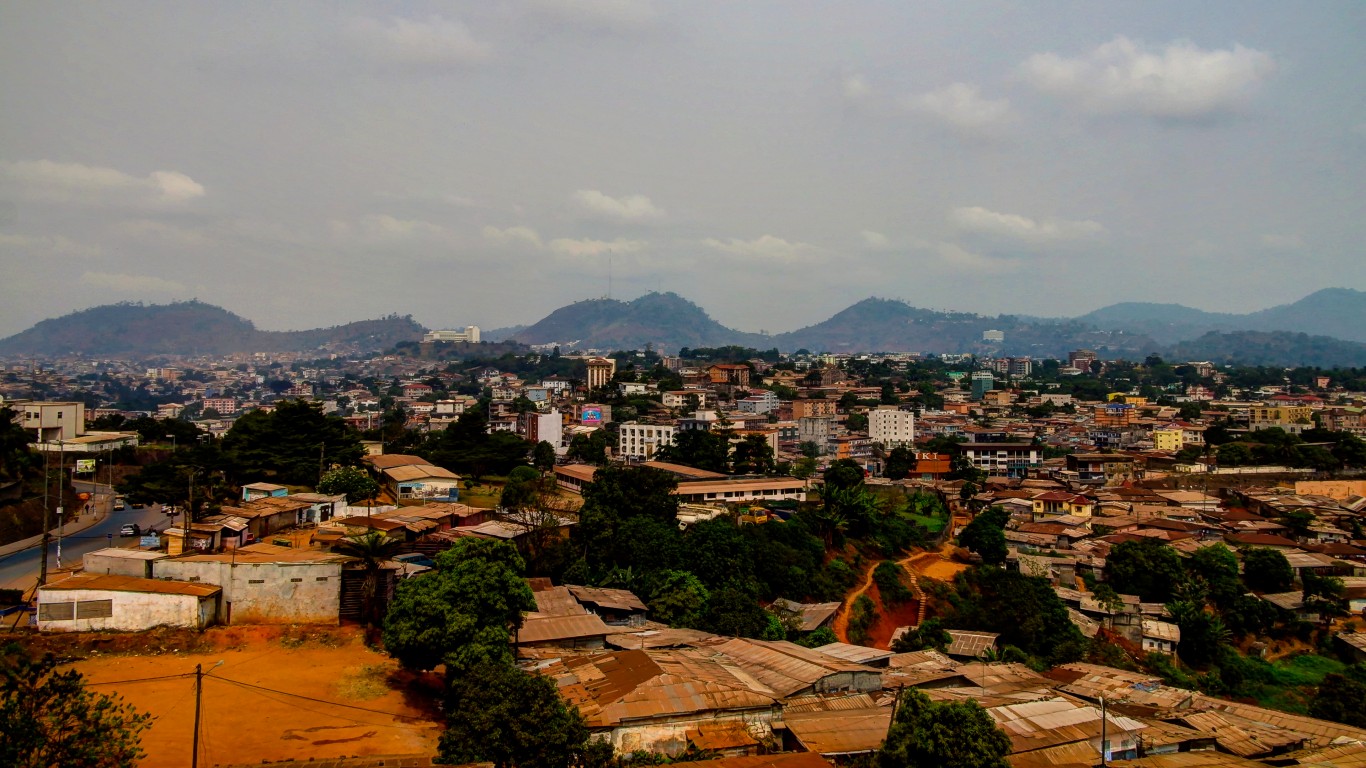
14. Cameroon
> Projected growth, 2022 to 2100: +278.8% (+81.7 million people)
> Current population: 29.3 million
> Crude birth rate: 34.9 per 1,000 people
> Annual net migration: -0.2 per 1,000 residents
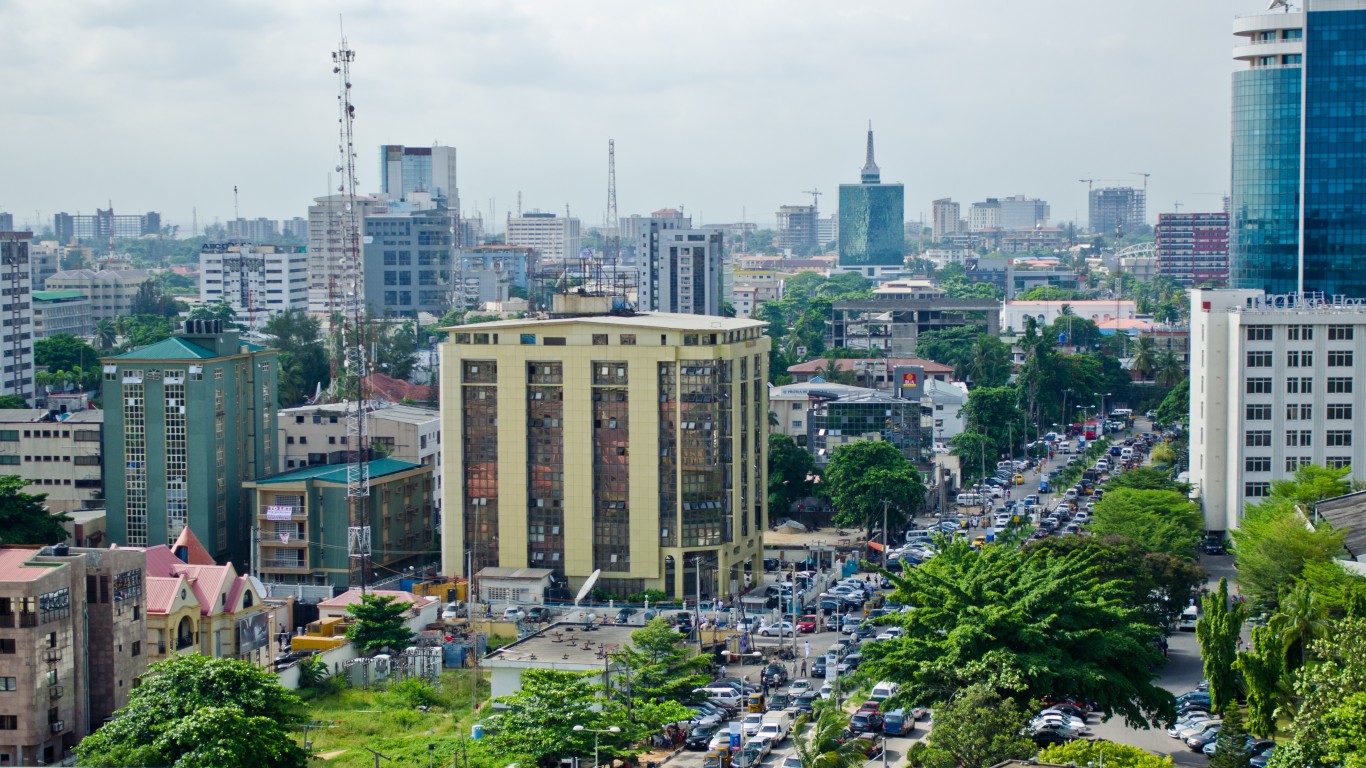
13. Nigeria
> Projected growth, 2022 to 2100: +278.9% (+627.8 million people)
> Current population: 225.1 million
> Crude birth rate: 37.4 per 1,000 people
> Annual net migration: -0.3 per 1,000 residents

12. Burundi
> Projected growth, 2022 to 2100: +281.1% (+35.7 million people)
> Current population: 12.7 million
> Crude birth rate: 38.4 per 1,000 people
> Annual net migration: +0.2 per 1,000 residents
[in-text-ad-2]
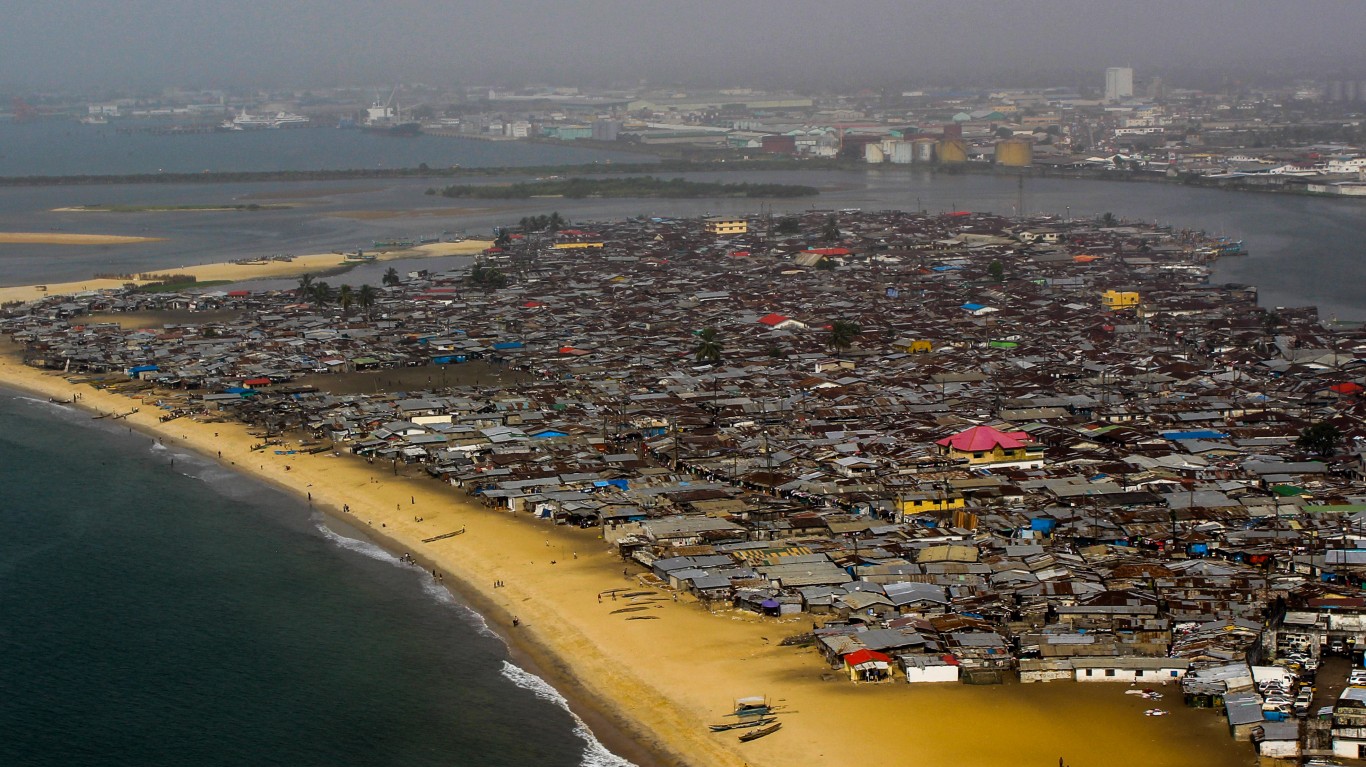
11. Liberia
> Projected growth, 2022 to 2100: +284.0% (+15.2 million people)
> Current population: 5.4 million
> Crude birth rate: 32.7 per 1,000 people
> Annual net migration: -1.1 per 1,000 residents
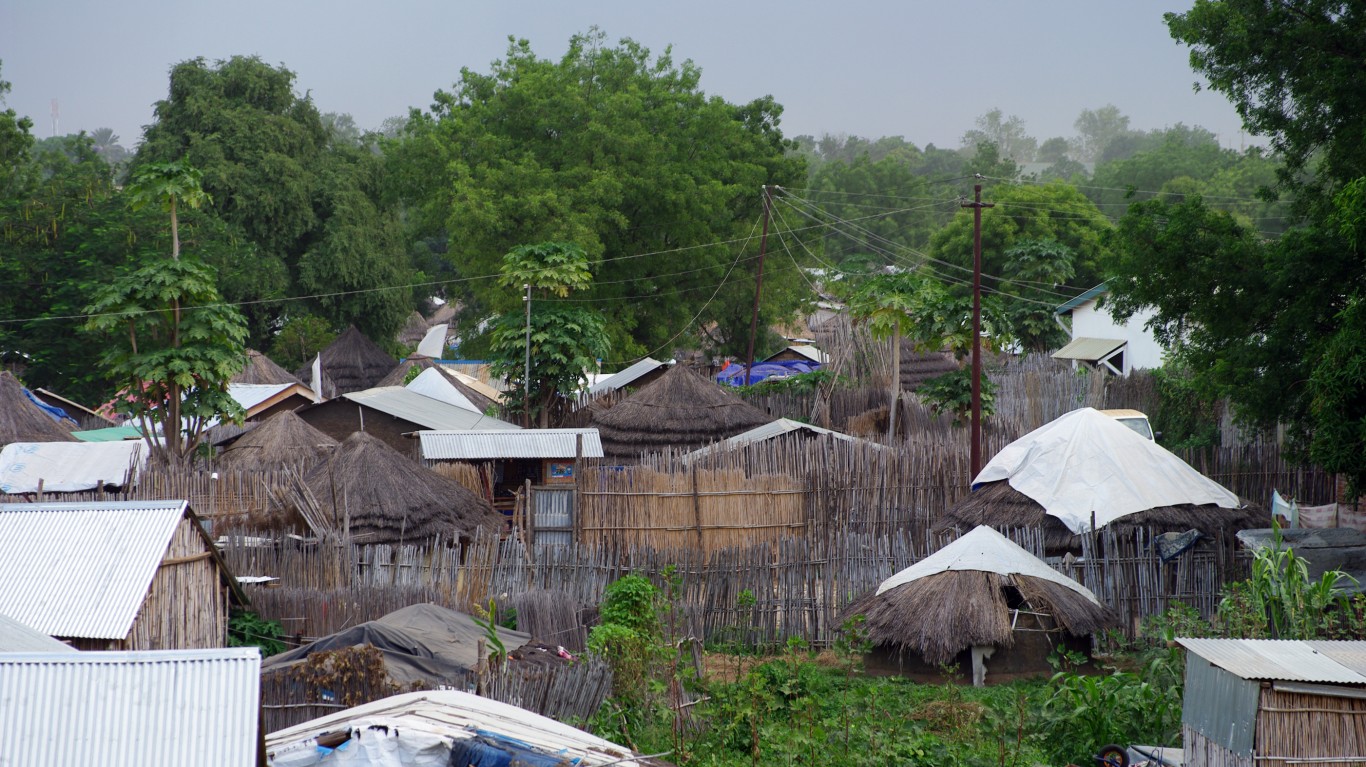
10. South Sudan
> Projected growth, 2022 to 2100: +291.7% (+33.7 million people)
> Current population: 11.5 million
> Crude birth rate: 34.7 per 1,000 people
> Annual net migration: -16.3 per 1,000 residents
[in-text-ad]
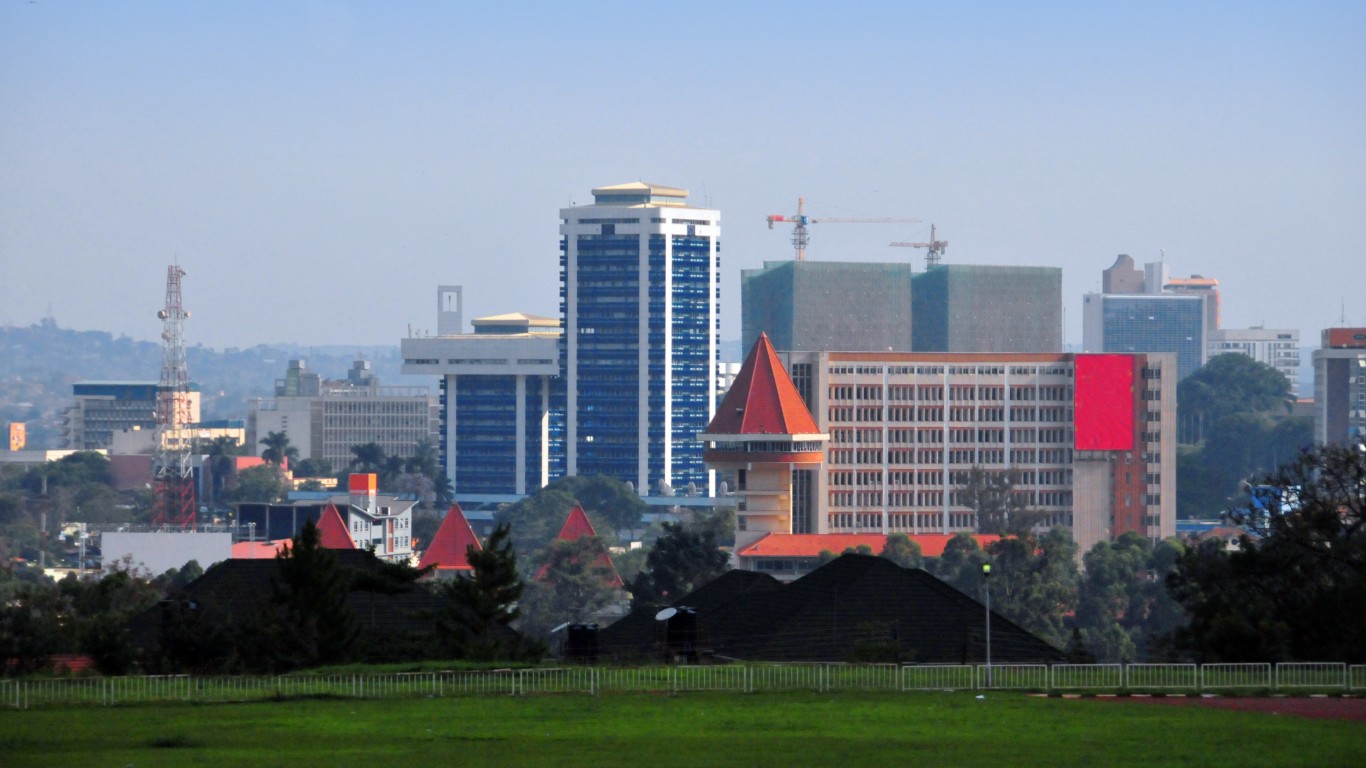
9. Uganda
> Projected growth, 2022 to 2100: +303.7% (+140.3 million people)
> Current population: 46.2 million
> Crude birth rate: 37.4 per 1,000 people
> Annual net migration: +4.4 per 1,000 residents
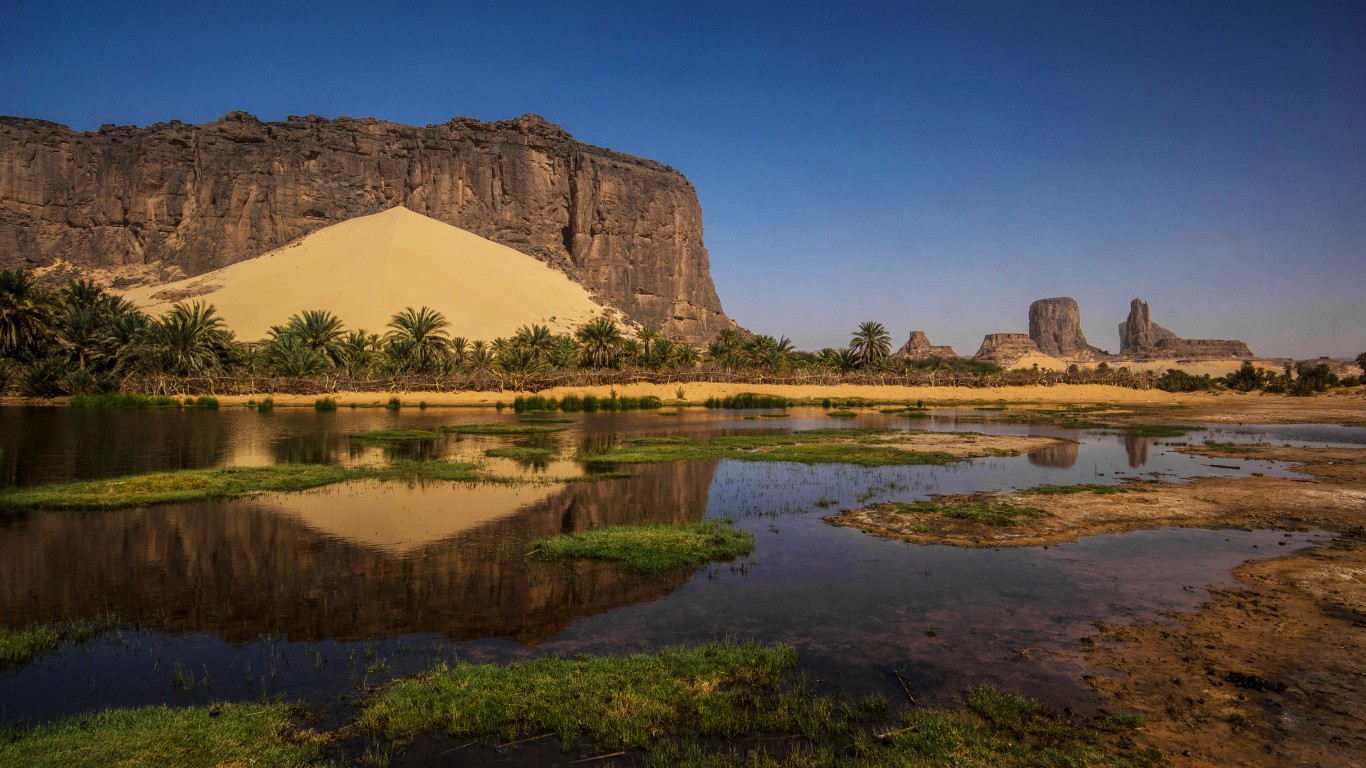
8. Chad
> Projected growth, 2022 to 2100: +307.0% (+55.1 million people)
> Current population: 18.0 million
> Crude birth rate: 41.7 per 1,000 people
> Annual net migration: +0.1 per 1,000 residents
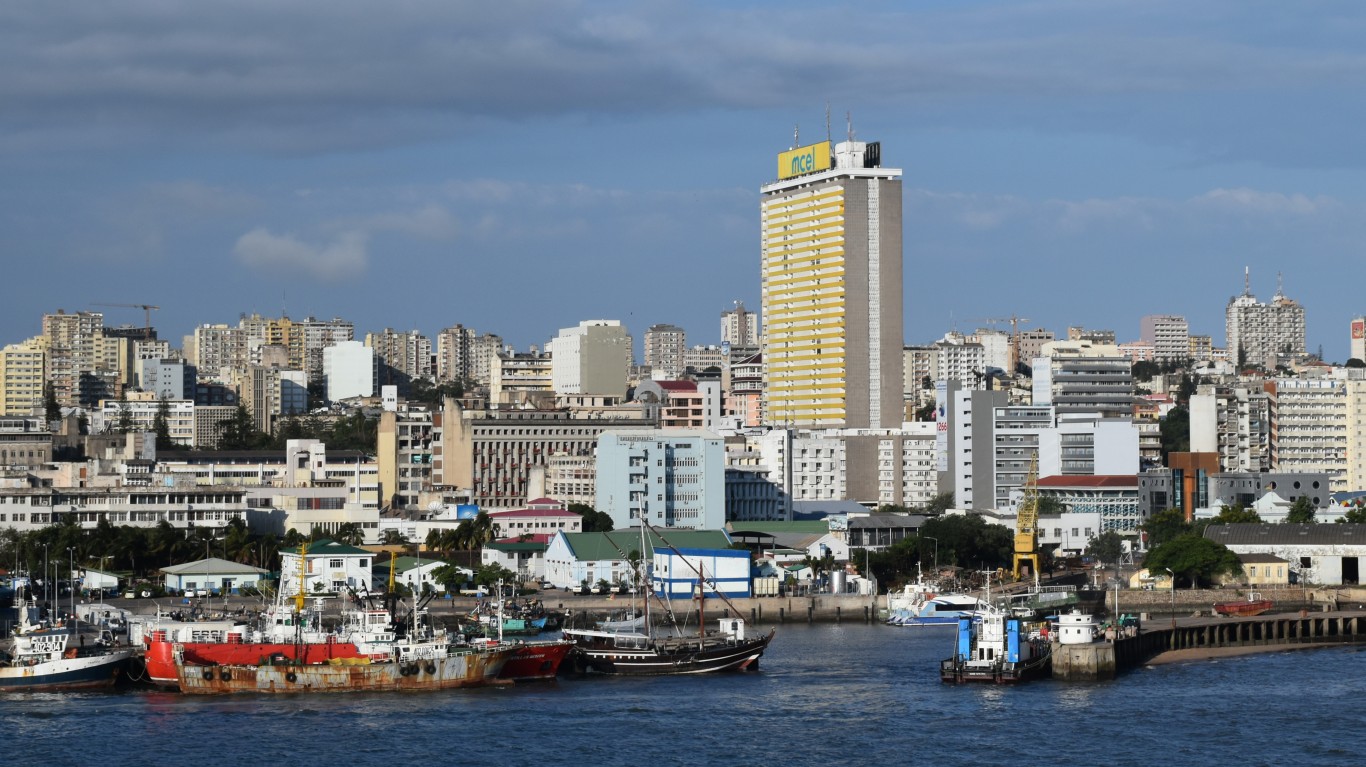
7. Mozambique
> Projected growth, 2022 to 2100: +315.2% (+99.9 million people)
> Current population: 31.7 million
> Crude birth rate: 37.2 per 1,000 people
> Annual net migration: -0.2 per 1,000 residents
[in-text-ad-2]
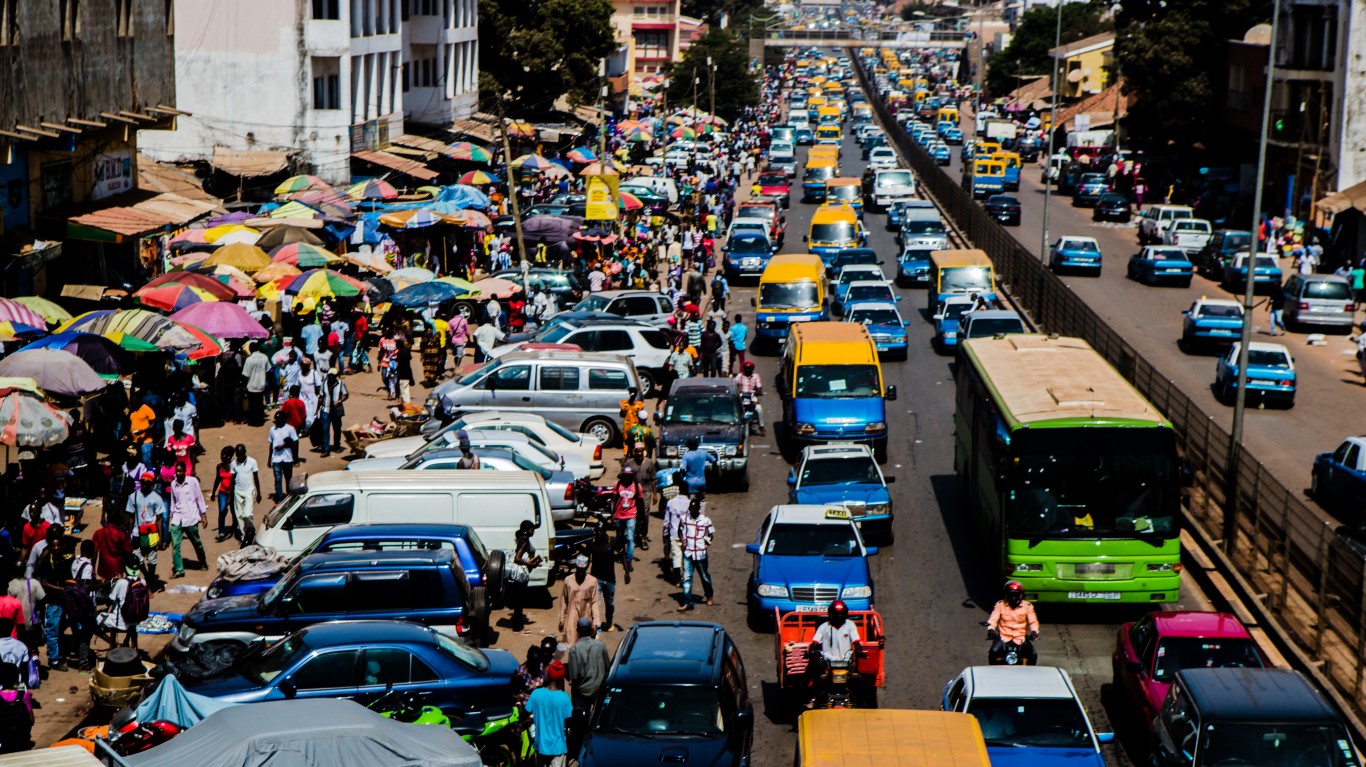
6. Guinea-Bissau
> Projected growth, 2022 to 2100: +331.1% (+6.7 million people)
> Current population: 2.0 million
> Crude birth rate: 34.6 per 1,000 people
> Annual net migration: -0.8 per 1,000 residents
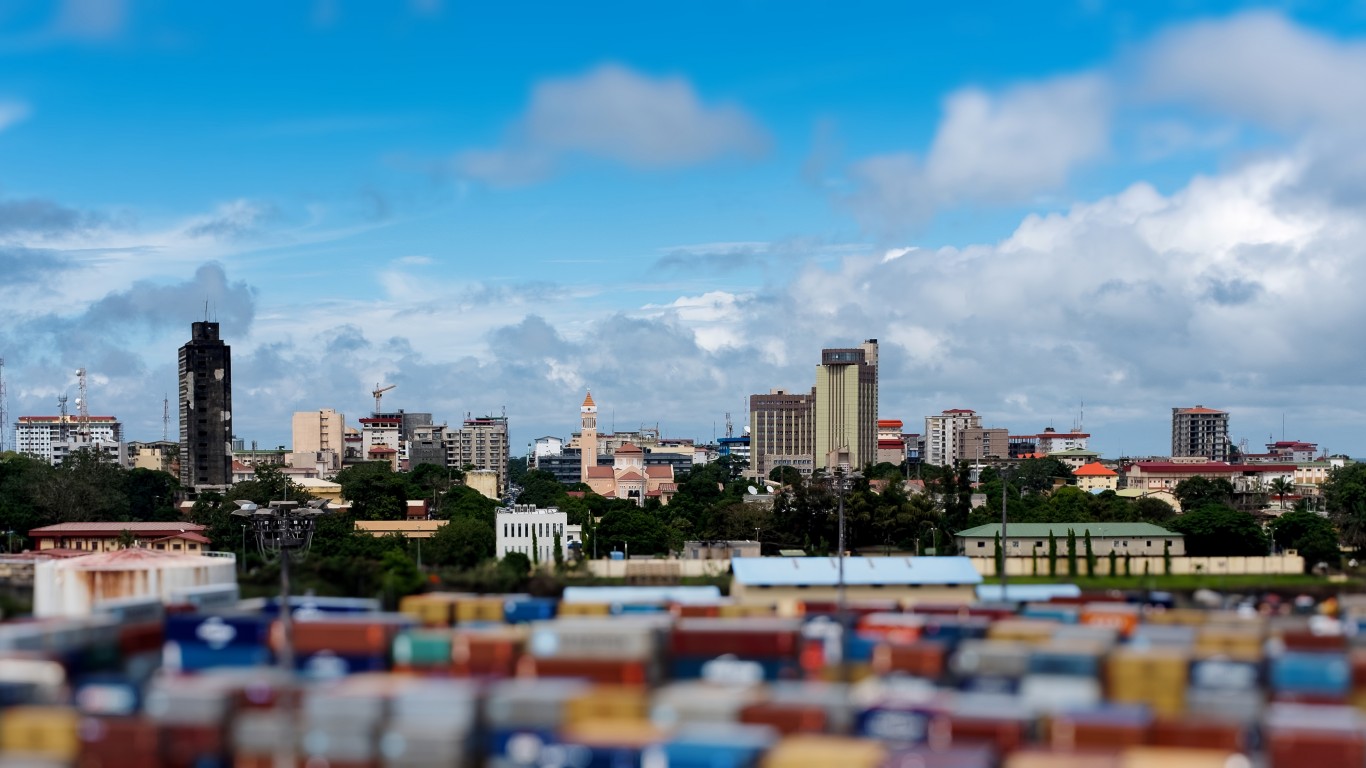
5. Guinea
> Projected growth, 2022 to 2100: +377.0% (+49.9 million people)
> Current population: 13.2 million
> Crude birth rate: 36.0 per 1,000 people
> Annual net migration: -0.3 per 1,000 residents
[in-text-ad]
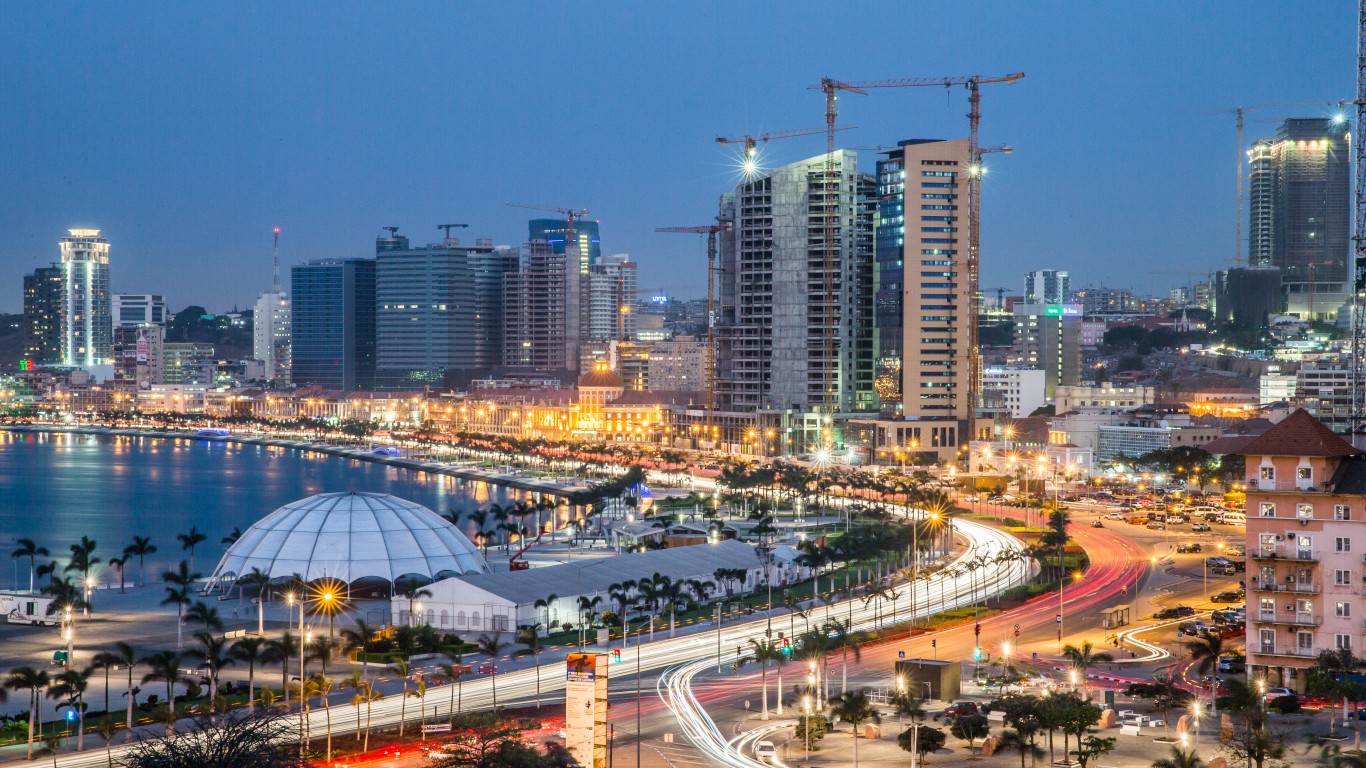
4. Angola
> Projected growth, 2022 to 2100: +437.0% (+152.1 million people)
> Current population: 34.8 million
> Crude birth rate: 40.2 per 1,000 people
> Annual net migration: +0.2 per 1,000 residents
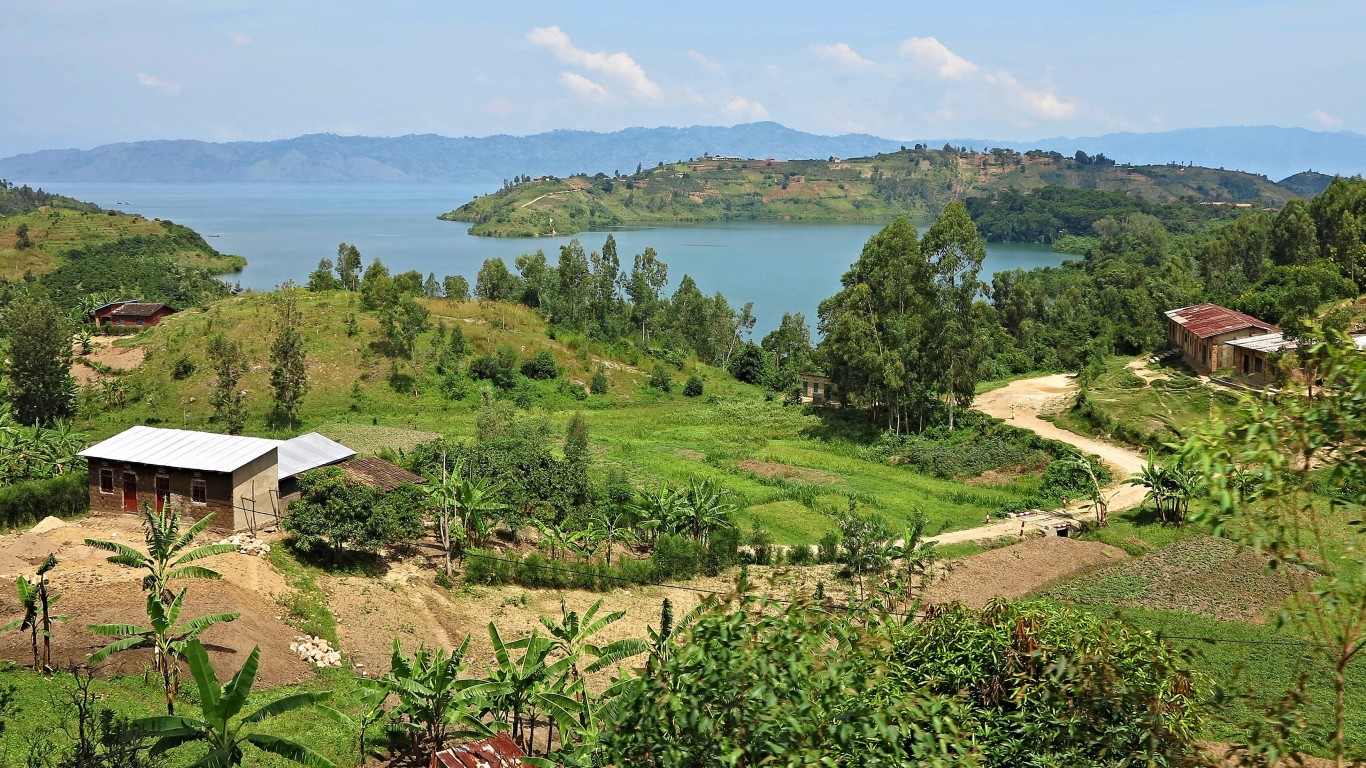
3. Democratic Republic of the Congo
> Projected growth, 2022 to 2100: +438.8% (+475.6 million people)
> Current population: 108.4 million
> Crude birth rate: 40.6 per 1,000 people
> Annual net migration: +0.3 per 1,000 residents
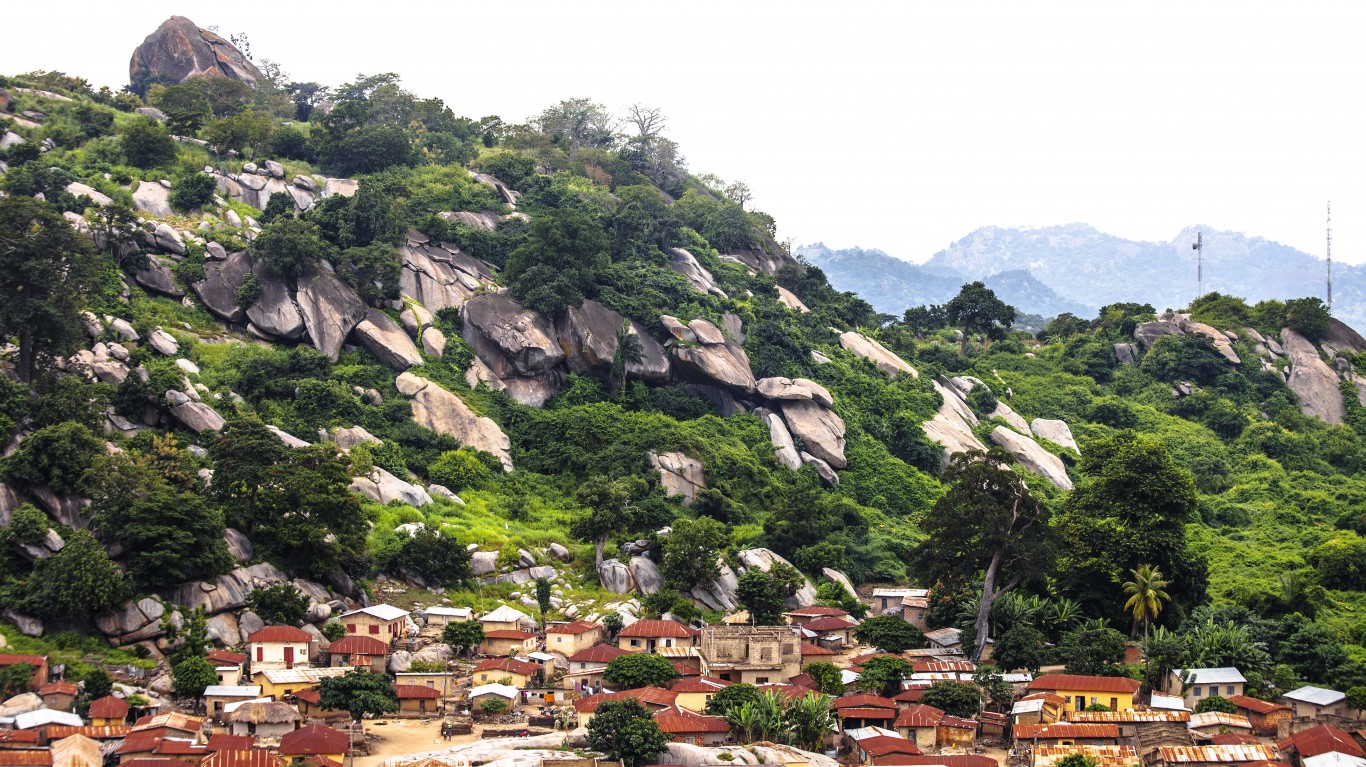
2. Benin
> Projected growth, 2022 to 2100: +524.4% (+72.1 million people)
> Current population: 13.8 million
> Crude birth rate: 35.8 per 1,000 people
> Annual net migration: -0.2 per 1,000 residents
[in-text-ad-2]
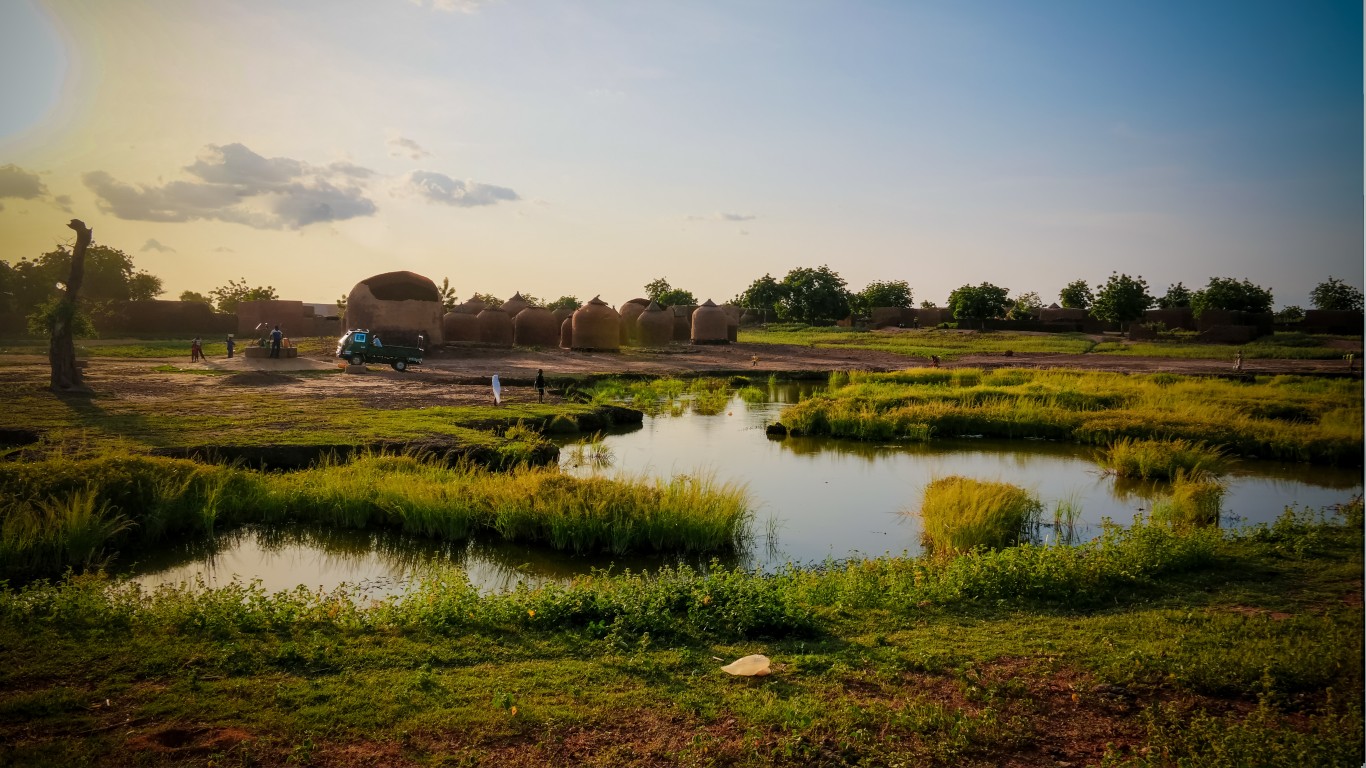
1. Niger
> Projected growth, 2022 to 2100: +537.5% (+131.6 million people)
> Current population: 24.5 million
> Crude birth rate: 45.6 per 1,000 people
> Annual net migration: +0.2 per 1,000 residents
The #1 Thing to Do Before You Claim Social Security (Sponsor)
Choosing the right (or wrong) time to claim Social Security can dramatically change your retirement. So, before making one of the biggest decisions of your financial life, it’s a smart idea to get an extra set of eyes on your complete financial situation.
A financial advisor can help you decide the right Social Security option for you and your family. Finding a qualified financial advisor doesn’t have to be hard. SmartAsset’s free tool matches you with up to three financial advisors who serve your area, and you can interview your advisor matches at no cost to decide which one is right for you.
Click here to match with up to 3 financial pros who would be excited to help you optimize your Social Security outcomes.
Have questions about retirement or personal finance? Email us at [email protected]!
By emailing your questions to 24/7 Wall St., you agree to have them published anonymously on a673b.bigscoots-temp.com.
By submitting your story, you understand and agree that we may use your story, or versions of it, in all media and platforms, including via third parties.
Thank you for reading! Have some feedback for us?
Contact the 24/7 Wall St. editorial team.
 24/7 Wall St.
24/7 Wall St.